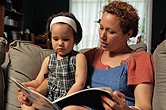 Reading to young children is well known to have benefits, including better language skills. And experts already urge parents to have a regular story time with their kids, starting at birth. It’s been assumed that the habit feeds youngsters’ brain development.
Reading to young children is well known to have benefits, including better language skills. And experts already urge parents to have a regular story time with their kids, starting at birth. It’s been assumed that the habit feeds youngsters’ brain development.
But the new findings, published online in the journal Pediatrics, offer hard evidence of that theory.
“It’s often said that reading builds brains,” said study leader Dr. John Hutton, of Cincinnati Children’s Hospital Medical Center. “That seems obvious, but you want to show that it’s actually true.”
So Hutton’s team used functional MRI scans to measure real-time brain activity in 19 children, aged 3 to 5 years, as they listened to stories and to sounds other than speech.
Parents were interviewed about “cognitive stimulation” at home, including how often they read to their children. Based on their responses, the number ranged from two nights a week to every night.
Overall, Hutton’s team found, the more often children had story time at home, the more brain activity they showed while listening to stories in the research lab.
Hutton said that finding is especially intriguing, because reading to children is assumed to spark their imaginations.
“When children listen to stories, they have to put it all together in their mind’s eye,” Hutton explained.
Even though children’s books have pictures, he added, that’s different from watching all the action play out on a TV or computer screen.
As it stands, the American Academy of Pediatrics advises parents to read to their children every day, starting at birth. That pre-kindergarten time is a critical time for brain development, Hutton said. Other research has found that children with poor reading skills in first grade usually do not “catch up” with their peers.
But is there something special about old-fashioned books, versus the reading apps many toddlers are now using on smartphones and tablets? That’s the next question for researchers. In the meantime, keep reading.
